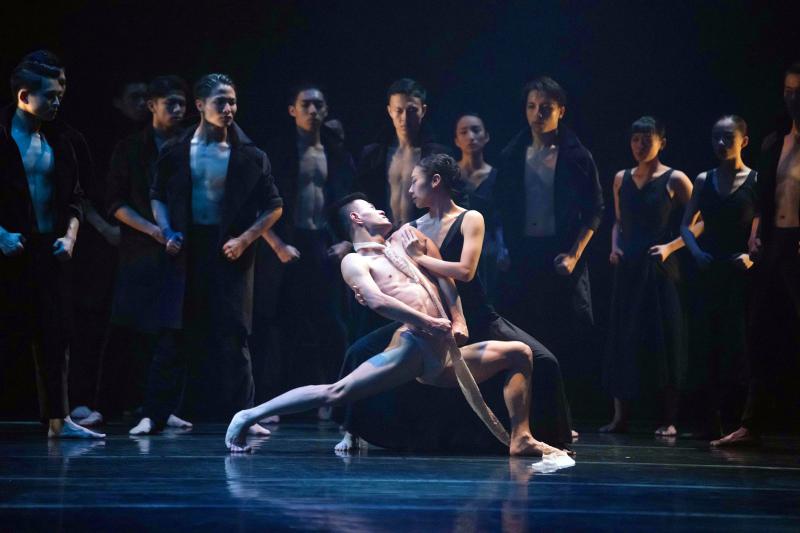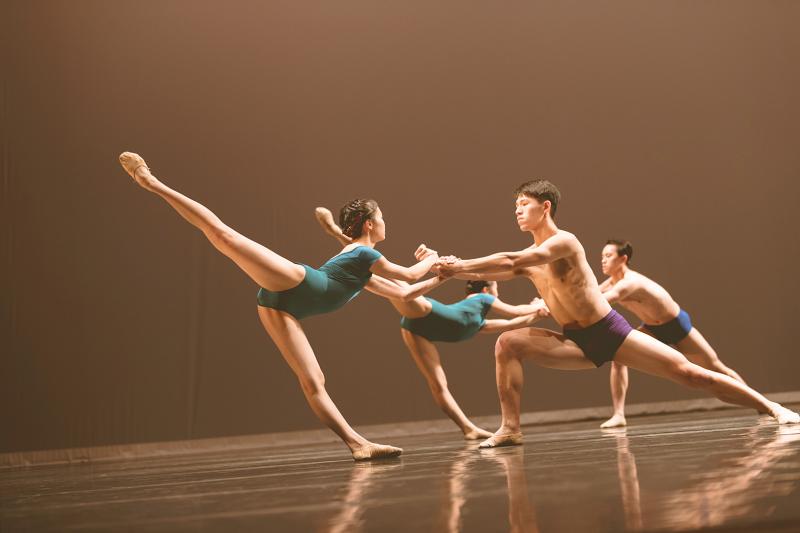This year’s Kuandu Arts Festival (關渡藝術節), which opened on Sept. 23 and runs through Nov. 29, is focused on music.
Under the theme “Joy of Music,” a nod to the 250th birthday of Ludwig van Beethoven, the program features performances by seven symphony orchestras as well as several Taipei National University of the Arts (TNUA, 國立臺北藝術大學) student and faculty shows, in addition to the annual film and animation festivals.
However, there is still room for other performing arts, and two productions this weekend and next at the university in the hills of Taipei’s Guandu area (關渡) feature students from the School of Dance.

Photo courtesy of Chang Chia-hou
The dance department is celebrating its 38th anniversary, so it is fitting that this weekend’s show, Four Chapters Of The Floating Life (浮生四闕), feature works ranging from ballet to contemporary to post-modern, choreographed by two faculty members, a guest professor and an alumnus.
The show’s artistic director, Chiang Chiou-o (蔣秋娥), choreographed 2020 Spring, a classical ballet-based work set to Max Richier’s take on the “Spring” section from Vivaldi’s The Four Seasons.
Alumnus and Batsheva dancer turned freelance dancer/choreographer Lee Chen-wei (李貞葳) has contributed Unfold Unpaid (非常非償), an exploration of the conflicts and disasters confronting modern society, set to music by Teho Teardo, Death Grips, Ben Frost and others.

Photo courtesy of the Kuandu Arts Festival
Australian Leigh Warren’s GREEN T, created for graduate students, is a three-part work inspired by the ideals of the postmodern movement and the pop culture of the time, set to music by John Cage and Steve Reich.
The final work on the program is The Floating Life (浮生) by Zhang Xiaoxiong (張曉雄), a restaging of a work he created for the 2006 Hong Kong Dance Academy Dance Festival, To Friends in Heaven.
Zhang adapted the piece for Taipei Crossover Dance Company (台北越界舞團) in 2008 and then restaged it this year for the students.

Photo courtesy of Formosa Circus Art
Set to Dmitri Shostakovich’s String Quartet No. 8, it is a powerful work focusing on the relationship between work and history, dance and music.
Back in 2008, he said it was about “people who could not choose the time and environment in which they lived, but who had the courage to face what they had to and the pride to do so.”
Then-TNUA student Wu Chien-wei (吳建緯) gave a mesmerizing performance in the 2008 production, and I am looking forward to seeing what the current crop of students do with it this time.

Photo courtesy of Wu Jun-yen
Zhang also choreographed another work for the festival, Through Mist And Rain (一蓑煙雨), which will be performed next weekend by TNUA students.
It is the latest installment of a collaboration between the university’s School of Music and School of Dance that began in 2018.
The first version of Through Mist And Rain debuted last year as a 30-minute work, but Zhang and his collaborators conducted additional research and field work to expand it to 60 minutes.
There are two shows, Saturday next week at 7:30pm and Sunday at 2:30pm in the Dance Theater and tickets are NT$600.
Meanwhile, dance is also key to a performance at the Cloud Gate Theater this week, with help from another TNUA alumnus.
The Formosa Circus Art (FOCA, 福爾摩沙馬戲團) troupe will perform the final installment of its crossover trilogy, Moss (苔痕).
Moss is a collaboration with the Germany-based Peculiar Man, founded by Tien Tsai-wei (田采薇), a dancer with Tanztheater Wuppertal Pina Bausch, and Jan Mollmer, and combines circus stunts and acrobatics with dance theater.
The idea was to focus on exploring the meaning behind the performance, and the production was inspired by a photograph of an abandoned building covered with vines, which conjured up the idea of a house of forgotten dreams and memories.
FOCA says the show explores loss, absence, presence and loneliness.

June 23 to June 29 After capturing the walled city of Hsinchu on June 22, 1895, the Japanese hoped to quickly push south and seize control of Taiwan’s entire west coast — but their advance was stalled for more than a month. Not only did local Hakka fighters continue to cause them headaches, resistance forces even attempted to retake the city three times. “We had planned to occupy Anping (Tainan) and Takao (Kaohsiung) as soon as possible, but ever since we took Hsinchu, nearby bandits proclaiming to be ‘righteous people’ (義民) have been destroying train tracks and electrical cables, and gathering in villages

Swooping low over the banks of a Nile River tributary, an aid flight run by retired American military officers released a stream of food-stuffed sacks over a town emptied by fighting in South Sudan, a country wracked by conflict. Last week’s air drop was the latest in a controversial development — private contracting firms led by former US intelligence officers and military veterans delivering aid to some of the world’s deadliest conflict zones, in operations organized with governments that are combatants in the conflicts. The moves are roiling the global aid community, which warns of a more militarized, politicized and profit-seeking trend

The wide-screen spectacle of Formula One gets a gleaming, rip-roaring workout in Joseph Kosinski’s F1, a fine-tuned machine of a movie that, in its most riveting racing scenes, approaches a kind of high-speed splendor. Kosinski, who last endeavored to put moviegoers in the seat of a fighter jet in Top Gun: Maverick, has moved to the open cockpits of Formula One with much the same affection, if not outright need, for speed. A lot of the same team is back. Jerry Bruckheimer produces. Ehren Kruger, a co-writer on Maverick, takes sole credit here. Hans Zimmer, a co-composer previously, supplies the thumping

Dr. Y. Tony Yang, Associate Dean of Health Policy and Population Science at George Washington University, argued last week in a piece for the Taipei Times about former president Ma Ying-jeou (馬英九) leading a student delegation to the People’s Republic of China (PRC) that, “The real question is not whether Ma’s visit helps or hurts Taiwan — it is why Taiwan lacks a sophisticated, multi-track approach to one of the most complex geopolitical relationships in the world” (“Ma’s Visit, DPP’s Blind Spot,” June 18, page 8). Yang contends that the Democratic Progressive Party (DPP) has a blind spot: “By treating any